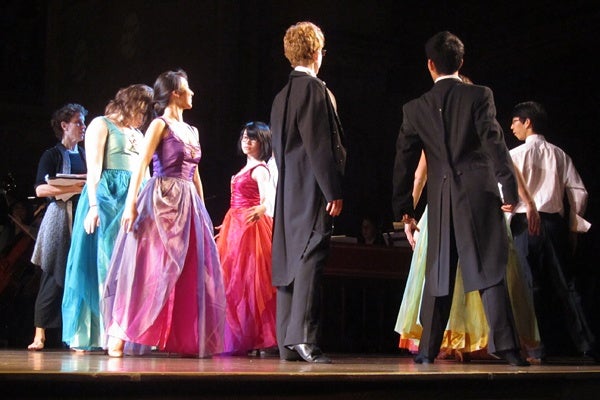Princeton presents long-silenced Prokofiev work
On Thursday, Princeton University will premiere a lost musical play by the Russian composer Sergei Prokofiev.
“Eugene Onegin,” based on the novel in verse by Russian poet Alexander Pushkin, tells the story of the titular 19th-century dandy who carelessly wanders through the affections of a country girl named Tatyana.
Pyotr Tchaikovsky composed a well-known opera based on the story, but in 1936 — to officially commemorate the 100-year anniversary of Pushkin’s death — a state-run theater commissioned Prokofiev to compose the music for a play version, adapted by Sigizmund Krzhizhanovsky.
If you’ve never heard of Sigizmund Krzhizhanovsky, you’re not alone.
“I’ve been working with the adaptation of Pushkin for 40 years, and I’ve never heard of the adaptor, Sgizmund Krzhizhanovsky,” said Caryl Emerson, a professor in the Slavic language department of Princeton University, who guided the script to the stage.
Before rehearsals for that play could begin 75 years ago, the production was abruptly cancelled and the Stalinist government sealed both the music and the script in its archives. Fragments of the music resurfaced over the years; the script was effectively erased from history.
Fast-forward to the 1990s. Under the rule of President Boris Yeltsin, many of the state archives were opened to public scrutiny. However, many documents related to Prokofiev remained sealed by request of the family.
While conducting research on Prokofiev for a book, Simon Morrison of Princeton University’s music department convinced the Prokofiev family to allow him into the closed archives, where he discovered the working script for “Eugene Onegin,” with hand-written notations in Prokofiev’s hand.
This is not the first “lost” Prokofiev brought to light by Morrison, but it is the one that is getting the splashiest premiere. The Princeton Symphony Orchestra, headed by Rossen Milanov, will perform the score with full choir and staging by costumed dancers and actors.
Staging proves challenging
During a rehearsal two days before the premiere, Milanov and choreographer Rebecca Lazier and the voice actors were still figuring out how to drive the ship. The staging is difficult because the script and the music don’t really fit. The production in 1937 did not get to rehearsal, so Prokofiev and Krzhizhanovsky never had the chance to work out the kinks.
“The music was written, but the script was never approved,” said Emerson. “We don’t know what would have happened — how Prokofiev might have adjusted his music, or how Krzhizhanovsky would have tweaked the text. All that, we have to creatively interpret.”
Onstage, men in tuxedos and women in colorful gowns partner up in formal, courtly dancing, while pixielike Tatyana — barefoot and wide-eyed — flits between them. She toggles between romantic swoon and nightmarish shame.
Pushkin’s novel has very little dialogue. The narrator describing the story emphasizes inner torment over than external action. The stage adaptation puts the words into the mouths of characters.
“The people have to speak for themselves, and that was unnerving to have Pushkin’s novel put into a dramatic form where being talked about was replaced by speakers addressing each other,” said Emerson. “So much of the novel is cerebral.”
That’s what got the original production in political hot water. Altering Pushkin — a national literary icon — was seen as a threat to Russian literary tradition. This was at a time when Josef Stalin was purging those perceived as enemies of the state. Fearfully, the theater shut down the production in 1936, before it was even cast.
The Princeton production reconciles the grand sweep of the music with the intimacy of the characters’ internal conflicts by staging two productions of “Eugene Onegin.” The first, Thursday in Alexander Hall, will emphasize the music with the Princeton Symphony Orchestra. With only piano accompaniment, the second will stress the actors’ dialogue Friday, Saturday and Sunday, then again Feb. 16 through 18, in Lewis Center for the Arts.
WHYY is your source for fact-based, in-depth journalism and information. As a nonprofit organization, we rely on financial support from readers like you. Please give today.








